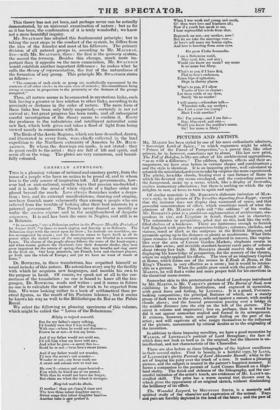CHESKIAN ANTHOLOGY.
THIs is a pleasing volume of national and amatory poetry, from the muse of a people who have no nation to be proud of, and to whom love is the only source of inspiration left. All governments, how- ever bad or anti-national, usually leave that passion unshackled ; and it is made the most of when objects of a higher order are placed beyond the reach. Love always flourishes under a despo- tism: love, and its external manifestations, dancing and singing, nowhere flourish more vehemently than among a people who are relieved from the trouble of looking after their best interests by a paternal government. The French never danced so merrily as under the ancien regime and in the neighbourhood of despotic seigneurs. It is and has been the same in Naples,. and still is so in Bohemia.
"In no country," save a Bohemian author in the Prague 211»2tIlly Periodical for August l7, "is there so much singing and dancing as in Bohemia. The Bohemian sings with the sweat upon his brow ; his festivals are worthless, un- less accompanied by music ; and his devotion seems to burst forth in all its power when the united voices of the congregation are blended in a common hymn. The chorus of the people always follows the tones of the hand-organ ; and when winter gathers the choristers into their domestic abodes, they soon grow impatient for the return of spring, that they may breathe and sing anew on the fresh air. Our harp minstrels, our French horn and clarionet players, go forth into the whole ot Europe; and yet we have no want of music at home."
Dr. BowniNG, in these translations, has acquitted himself as usual in tasks of this nature. He astonishes every one by the facility with which he acquires new languages, and moulds his own to the purpose in hand. Of course, we speak not at all to the cor- rectness of the translation : no one is bound to know all the lan- guages, Dr. BOWRING reads and writes : and it seems in future no one is to calculate the nature of the work to be expected from him. We were looking rather to a book of arithmetical than po- etical figures, as the result of his Parisian labours; but it seems he knows his way as Well to the Bibliotheque du Roi as the Palais Royal.
We select the following as pleasing specimens of this volume, which might be called the "Loves of the Bohemians."
Kdyby se taynd newadil.
But for my father's angry talking, I'd frankly own that I was walking With one—whom he could not discover—. Frown he or not—it was my lover.
And if my father would not scold me, I'd tell him what my lover told me; And what he gave—a secret this is- , Scold he or nut—'twas love's sweet kisses.
And if my father would not wonder, I'd tear the secret's veil asunder— Wonder or not—my lover made me A sweet and solemn vow to wed me.
He voW'd—sincere and eager-hearted- E'en while he kiss'd me as we parted, With thee he would not leave me longer, But claim me when the wheat is stronger.
1%4 tak matieka dbala.
0 mother! thou art chang'd since erst Thy love thine infant daughter nurst; Sweet songs that infant daughter heard- Another-babe. is Tw prefered. When I was weak and young and small, 0! thou wert love and kindness all; Now if a youth but speak to me, I hear reproachful words from thee.
Reproach me not—my mother, now! But let me take the marriage vow—. At love's soft name my bosom sighs, And love is bursting from mine eyes.
Ga gsem Cesha hezaunka. I am a Bohemian maid,
- Blue eyed, fair, and airy; Would you know my name? my name Is no name but Mary.
What's to you if I have fled, Fled to love's embraces, Eaten hips of eglantine, Slept in thorny places.
What's to you, if I allow Youths of love to chatter: Let them rattle at my door, Surely 'tis no matter!
I will marry—wherefore talk—
Wherefore talk, any mother; Am I yet a year too young? Must I wait another?
No! I'm young—and I am fair—
Gay, blue-eyed, and airy-- Would you know the maiden's name, Sir! her name is Mary !


























 Previous page
Previous page